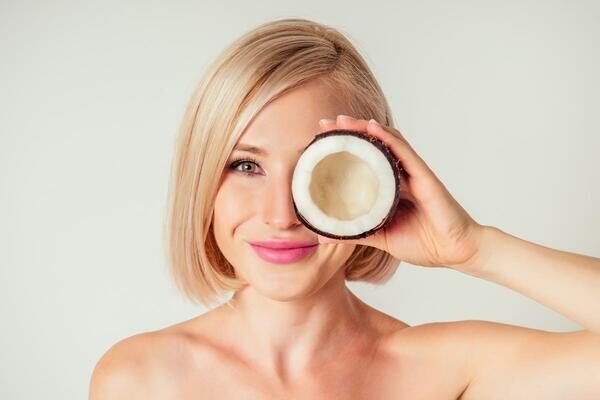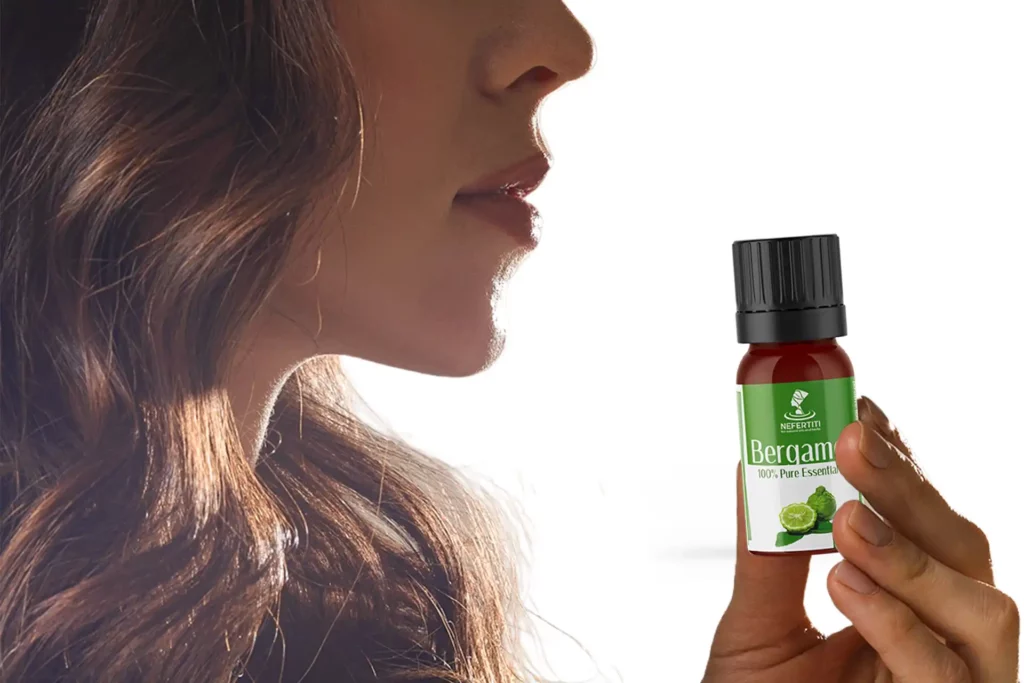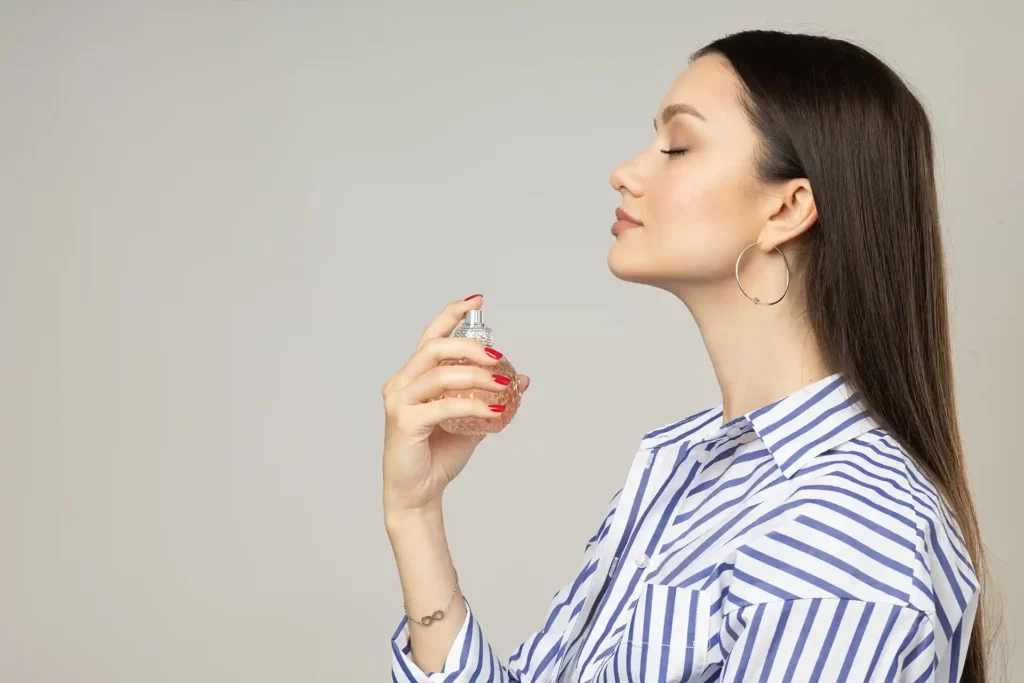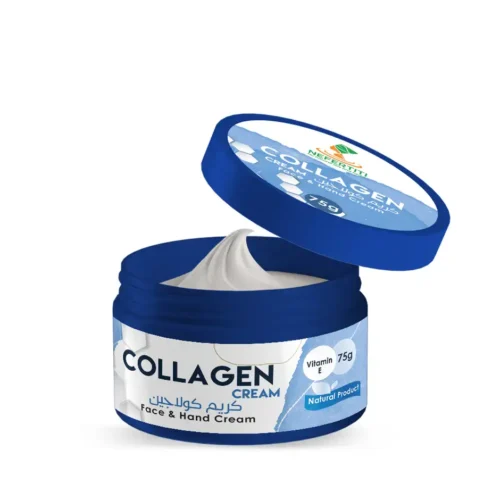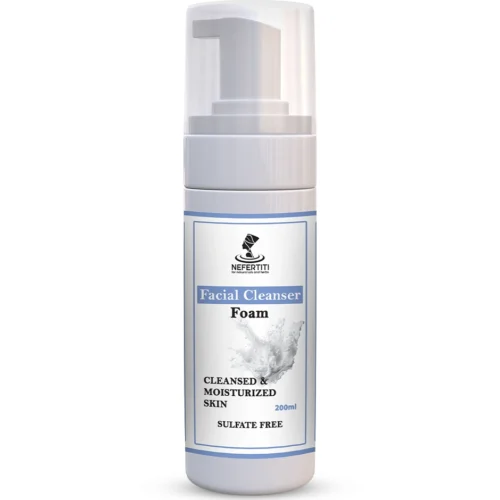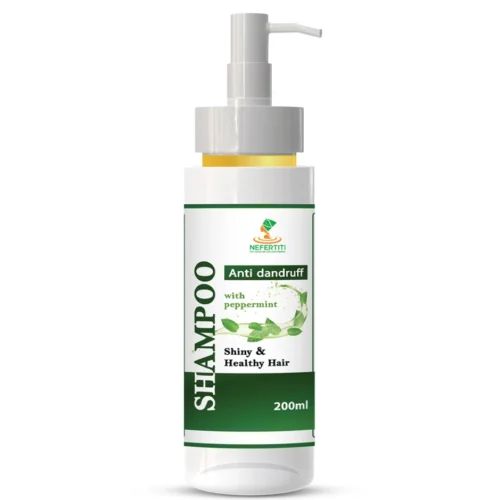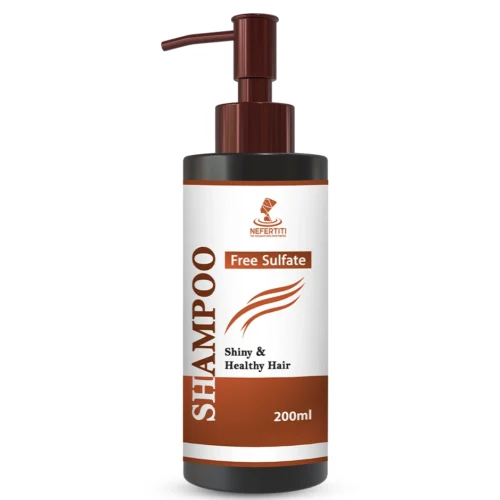What is “maskne”?
Maskne is the name given to the acne which is triggered by friction or pressure from the wearing of a protective face mask, the name being derived from a cross between mask and acne, although its true scientific name is acne mechanica. Its nothing new and has troubled people in the medical profession for years, but now with the wearing of protective masks still very much a part of everyday life in many countries, it has elevated very much into the public domain, and is yet another obstacle to contend with from this ongoing epidemic.
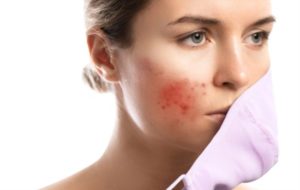 If you’ve been wearing a mask for prolonged periods of time you may have noticed breakouts across the chin, cheeks, nose and around the mouth, or experienced skin sensitivity (particularly if the mask is tight fighting). Alternatively the mask can make the skin dry and itchy, induce contact dermatitis, or exacerbate skin ailments such as eczema and rosacea. Despite the relaxation on the wearing of masks in a number of countries, it looks like they will still be around for a while longer as they remain mandatory in certain situations, such as on public transport, including long plane journeys (and perhaps at your destination country), during large gatherings, or maybe even as a requirement for certain jobs. Therefore maskne remains an issue for the foreseeable future, so what causes these breakouts and what can we do to resolve and deter this?
If you’ve been wearing a mask for prolonged periods of time you may have noticed breakouts across the chin, cheeks, nose and around the mouth, or experienced skin sensitivity (particularly if the mask is tight fighting). Alternatively the mask can make the skin dry and itchy, induce contact dermatitis, or exacerbate skin ailments such as eczema and rosacea. Despite the relaxation on the wearing of masks in a number of countries, it looks like they will still be around for a while longer as they remain mandatory in certain situations, such as on public transport, including long plane journeys (and perhaps at your destination country), during large gatherings, or maybe even as a requirement for certain jobs. Therefore maskne remains an issue for the foreseeable future, so what causes these breakouts and what can we do to resolve and deter this?
What causes these breakouts?
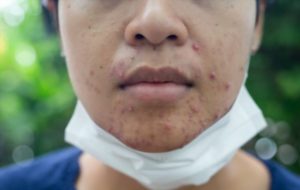 Our mouths are full of bacteria and viruses, and when we exhale they are released into the environment. The mask prevents them from being dispelled into the air and keeps them close to the skin instead, whilst the warm moist humid conditions which the mask creates can help to accelerate the growth of these organisms. Since a mask needs to fit snugly to be effective, it can cause friction, and sensitise and irritate the skin. Worse still, it can also cause micro tears in the epidermis which is much thinner on the face than other parts of the body, and allow bacteria to easily penetrate the skin. The mask can also play havoc with sebum production, helping to increase oiliness or dryness and causing blocked pores from increased sebum or discarded skin cells, sweat and dirt trapped against the skin. Overall it’s ideal conditions for the bacteria to thrive and can cause a number of skin ailments. Stress levels, which have likely been elevated throughout the pandemic, can also have an adverse effect on the skin.
Our mouths are full of bacteria and viruses, and when we exhale they are released into the environment. The mask prevents them from being dispelled into the air and keeps them close to the skin instead, whilst the warm moist humid conditions which the mask creates can help to accelerate the growth of these organisms. Since a mask needs to fit snugly to be effective, it can cause friction, and sensitise and irritate the skin. Worse still, it can also cause micro tears in the epidermis which is much thinner on the face than other parts of the body, and allow bacteria to easily penetrate the skin. The mask can also play havoc with sebum production, helping to increase oiliness or dryness and causing blocked pores from increased sebum or discarded skin cells, sweat and dirt trapped against the skin. Overall it’s ideal conditions for the bacteria to thrive and can cause a number of skin ailments. Stress levels, which have likely been elevated throughout the pandemic, can also have an adverse effect on the skin.
How to deter/resolve maskne
- Wash your face.
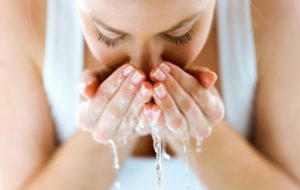 Always wash your face with lukewarm water immediately before and after removing a mask. This can prevent the build-up of bacteria and dirt on your face which can cause breakouts. Never wash your face in hot water as it can strip it of its natural oils, cause dryness, sensitivity and irritation, and compromise the skin barrier function. At the end of the day, wash your face with ½ teaspoon of jojoba oil to remove make-up and dirt. It’s non-comedogenic and helps to regulate sebum production. Simply massage into the skin for a minute or two, then lay a warm facecloth over the skin for one minute, before gently wiping off the oil. Never rub the skin with a towel to dry it, as this can also cause irritation and sensitivity, and even effect the skin’s elasticity. Instead pat it dry with a clean towel. Take care to only use gentle, non-perfumed detergents on the towel which you use on your face.
Always wash your face with lukewarm water immediately before and after removing a mask. This can prevent the build-up of bacteria and dirt on your face which can cause breakouts. Never wash your face in hot water as it can strip it of its natural oils, cause dryness, sensitivity and irritation, and compromise the skin barrier function. At the end of the day, wash your face with ½ teaspoon of jojoba oil to remove make-up and dirt. It’s non-comedogenic and helps to regulate sebum production. Simply massage into the skin for a minute or two, then lay a warm facecloth over the skin for one minute, before gently wiping off the oil. Never rub the skin with a towel to dry it, as this can also cause irritation and sensitivity, and even effect the skin’s elasticity. Instead pat it dry with a clean towel. Take care to only use gentle, non-perfumed detergents on the towel which you use on your face.
- Go natural
Now, more than ever, is the time to choose gentle products. Avoid alcohol, fragrance, chemicals and unnecessary preservatives. The skin is going through enough already, so there is no need to use harsh, chemical-laden products when there are natural products available which can do all, if not more, than these synthetic products can. Try to minimise your beauty routine and avoid layering lots of products on your skin. Less is definitely more when it comes to caring for our skin with natural products, which are multifunctional and can often substitute for several of our regular products.
- Moisturise, moisturise, moisturise!
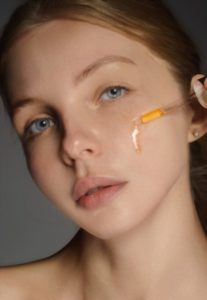 One of the most important things you can do is moisturise with a natural product. It prevents itchiness and dryness, and creates a physical barrier to help against friction and protect the skin from bacteria and dirt. Try some argan oil, it’s non-comedogenic, lightweight, non-greasy and gentle. It contains high amounts of oleic and linoleic acids and can perfectly hydrate the skin, and balance sebum production. Argan oil can help to reduce acne, redness and inflammation, including eczema and rosacea, and fade any post-acne scarring. Furthermore it is rich in antioxidants to fight free radicals. You can also add a few drops of essential oil to it for further benefits. This oil also makes a fantastic primer for the face, adding a natural glow, or you can add a few drops to your existing moisturiser or even your foundation.
One of the most important things you can do is moisturise with a natural product. It prevents itchiness and dryness, and creates a physical barrier to help against friction and protect the skin from bacteria and dirt. Try some argan oil, it’s non-comedogenic, lightweight, non-greasy and gentle. It contains high amounts of oleic and linoleic acids and can perfectly hydrate the skin, and balance sebum production. Argan oil can help to reduce acne, redness and inflammation, including eczema and rosacea, and fade any post-acne scarring. Furthermore it is rich in antioxidants to fight free radicals. You can also add a few drops of essential oil to it for further benefits. This oil also makes a fantastic primer for the face, adding a natural glow, or you can add a few drops to your existing moisturiser or even your foundation.
- Cut down on make-up
You may be someone who usually wears a lot of make-up, but covering your face in layers of foundation, concealer and powders, and then putting a mask on top is likely to make the skin sweat more, increase the chance of blocking the pores or hair follicles, and trap in more bacteria and dirt. Give your skin a rest from make-up whilst it’s covered by a mask, and if you really feel naked without some coverage, go light on the makeup or use a tinted moisturiser instead. As already mentioned above, argan oil can give a lovely healthy glow to the face, so who needs make-up anyway!
- Exfoliate
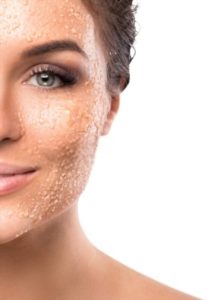 Removing bacteria and dead skin cells is key to preventing and resolving maskne. Exfoliate your skin at least once a week to remove buildup and unclog blocked cells. Try a natural product such as Nefertiti Black Seed Scrub, or make your own paraben-free sugar scrub by mixing together 1¼ cups brown sugar, ½ cup coconut oil, 2 tablespoons sweet almond oil, ¼ teaspoon essential oil (see below). To make, simply combine the coconut oil, sweet almond oil, essential oil, and add to the sugar mixture taking care to mix well. Store in a glass jar. To use, after washing the face, scoop some scrub out (be careful not to get water into the jar), and apply generously to wet skin. Massage into the skin in a circular motion to exfoliate and remove dead skin cells, rinse well with lukewarm water and pat the skin dry.
Removing bacteria and dead skin cells is key to preventing and resolving maskne. Exfoliate your skin at least once a week to remove buildup and unclog blocked cells. Try a natural product such as Nefertiti Black Seed Scrub, or make your own paraben-free sugar scrub by mixing together 1¼ cups brown sugar, ½ cup coconut oil, 2 tablespoons sweet almond oil, ¼ teaspoon essential oil (see below). To make, simply combine the coconut oil, sweet almond oil, essential oil, and add to the sugar mixture taking care to mix well. Store in a glass jar. To use, after washing the face, scoop some scrub out (be careful not to get water into the jar), and apply generously to wet skin. Massage into the skin in a circular motion to exfoliate and remove dead skin cells, rinse well with lukewarm water and pat the skin dry.
- Take a mask break
If you need to wear the mask for a prolonged period, ensure that you take a break at least every every four hours, as recommended by dermatologists who suggest removing the mask (in a safe environment) for a minimum of 15 minutes.
- Mask care
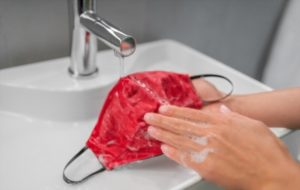 It really should go without saying that the same mask should not be used for more than one day, although half a day is better still, or ideally after every mask break. Everytime you put a used mask back on your face you’re re-exposing your skin to bacteria, moisture, dirt and dead skin cells which have already built up inside the mask. That seemingly clean looking mask is anything but, and it’s an open invitation to acne. Disposable masks should be just that, disposable! After use, do not leave it your bag, pocket or car for the next time you may need it. Avoid the temptation to reuse it by disposing of it responsibly at the end of each day. To avert any unfortunate accidents with wildlife, please remember to cut the straps before throwing it in the bin.
It really should go without saying that the same mask should not be used for more than one day, although half a day is better still, or ideally after every mask break. Everytime you put a used mask back on your face you’re re-exposing your skin to bacteria, moisture, dirt and dead skin cells which have already built up inside the mask. That seemingly clean looking mask is anything but, and it’s an open invitation to acne. Disposable masks should be just that, disposable! After use, do not leave it your bag, pocket or car for the next time you may need it. Avoid the temptation to reuse it by disposing of it responsibly at the end of each day. To avert any unfortunate accidents with wildlife, please remember to cut the straps before throwing it in the bin.
Your choice of mask also has a big influence over possible skin ailments, so never choose a mask simply because you like the colour or design – its not a fashion accessory! Choose a natural fabric which will allow the skin to breathe. A synthetic fabric such as polyester or rayon is more likely to irritate the skin and facilitate problems. Also avoid rough fabrics which can be abrasive on the skin and generate sensitivity. If you use a cloth mask, invest in more than one so that you can wash it at the end of every day. Ensure that you use a gentle perfume-free detergent to wash your cloth mask to avoid further issues with sensitivity/allergic reactions. Store the clean mask in a sealed container or bag.
It is important to always clean the hands before applying the mask and not to touch the mask during use.
- Keep calm
Stress can accelerate breakouts. Try to alleviate your stress with the healing power of essential oils. A little lavender oil added to your face products is calming for the skin and the mind. Alternatively use a diffuser, or just add a few drops to a tissue so that you can relieve stress and anxiety with a quick sniff whenever needed. Some lavender oil added to a bath product will also help to relax body and mind, and is a great sleep inducer after a long stressful day.
Added help with essential oils
A few drops of essential oil can be added to your existing skincare products to give an added boost without the use of harmful chemicals. They should never be applied directly to the skin as they are very concentrated and could irritate or even burn the skin. Alternatively dilute them with a carrier/base oil such as jojoba, almond or argan oil in a ratio of one drop to 5ml of base oil. The best recommended oils for maskne are:
Tea Tree Essential Oil
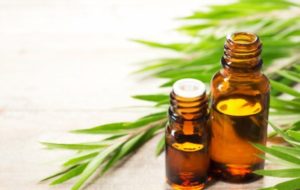 Tea tree oil is an excellent natural antiseptic and anti-inflammatory, and is one of the best oils for the treatment of acne and other bacterial, fungal and viral skin ailments. It effectively cleans, tones and purifies clogged pores, regulates sebum production to reduce oiliness and breakouts, and promotes wound healing, as well as relieving contact dermatitis, eczema, prickly heat, and other skin irritations, and soothing psoriasis. The effect of tea tree oil on acne has been compared to one of the most popular synthetic treatments. Tea tree oil also combines well with lavender or frankincense oil to soothe the skin.
Tea tree oil is an excellent natural antiseptic and anti-inflammatory, and is one of the best oils for the treatment of acne and other bacterial, fungal and viral skin ailments. It effectively cleans, tones and purifies clogged pores, regulates sebum production to reduce oiliness and breakouts, and promotes wound healing, as well as relieving contact dermatitis, eczema, prickly heat, and other skin irritations, and soothing psoriasis. The effect of tea tree oil on acne has been compared to one of the most popular synthetic treatments. Tea tree oil also combines well with lavender or frankincense oil to soothe the skin.
Frankincense Essential oil
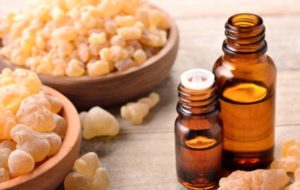 Frankincense has a long history of use for problem skin. It has powerful cleansing properties and also helps to enhance the protective function of the skin, as well as stimulating cell renewal. Soothing and nourishing, its sebum balancing, anti-inflammatory, antibacterial and wound healing properties are a savour to help resolve acne, eczema, general inflammation and calm any redness. It is a natural moisturiser to dispel dry and flaky skin. One study on frankincense oil’s effect on the skin confirmed its superb ability to reduce inflammation and remodel the skin tissue.
Frankincense has a long history of use for problem skin. It has powerful cleansing properties and also helps to enhance the protective function of the skin, as well as stimulating cell renewal. Soothing and nourishing, its sebum balancing, anti-inflammatory, antibacterial and wound healing properties are a savour to help resolve acne, eczema, general inflammation and calm any redness. It is a natural moisturiser to dispel dry and flaky skin. One study on frankincense oil’s effect on the skin confirmed its superb ability to reduce inflammation and remodel the skin tissue.
Rose Essential Oil
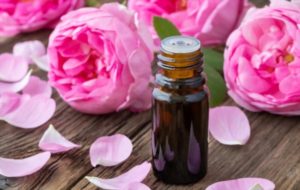 Rose oil is invaluable to damaged skin, and helps to strengthen the skin cells and stimulate skin regeneration. It has anti-bacterial, antifungal, anti-inflammatory, antioxidant, antiseptic and wound healing properties, and calms eczema, rosacea and psoriasis, and general skin irritation. As a natural cleanser and astringent it diminishes and protects against acne, removing excess oil and dirt, clearing blocked pores, toning the skin and eliminating the acne-causing bacteria “propionibacterium acnes”. Rose oil effectively maintains the skin’s natural pH balance and balances hydration levels to counteract dry or oily skin. By increasing the skin’s permeability it allows the better absorption of nutrients.
Rose oil is invaluable to damaged skin, and helps to strengthen the skin cells and stimulate skin regeneration. It has anti-bacterial, antifungal, anti-inflammatory, antioxidant, antiseptic and wound healing properties, and calms eczema, rosacea and psoriasis, and general skin irritation. As a natural cleanser and astringent it diminishes and protects against acne, removing excess oil and dirt, clearing blocked pores, toning the skin and eliminating the acne-causing bacteria “propionibacterium acnes”. Rose oil effectively maintains the skin’s natural pH balance and balances hydration levels to counteract dry or oily skin. By increasing the skin’s permeability it allows the better absorption of nutrients.
Geranium Essential Oil
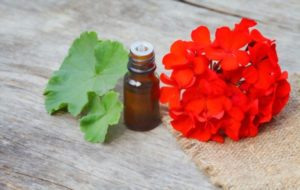 Similar to rose oil, geranium oil also helps to strengthen the skin and enhance skin regeneration. It regulates sebum production and balances the pH level of the skin to rebalance the skin. An effective remedy for eczema, dermatitis, psoriasis, and acne, it soothes and purifies the skin, accelerates wound healing, and reduces the appearance of scars. This potent skin-regenerator has antibacterial, anti-inflammatory, antioxidant, antifungal, anti-microbial, antiseptic, astringent, and wound healing properties to counteract skin conditions.
Similar to rose oil, geranium oil also helps to strengthen the skin and enhance skin regeneration. It regulates sebum production and balances the pH level of the skin to rebalance the skin. An effective remedy for eczema, dermatitis, psoriasis, and acne, it soothes and purifies the skin, accelerates wound healing, and reduces the appearance of scars. This potent skin-regenerator has antibacterial, anti-inflammatory, antioxidant, antifungal, anti-microbial, antiseptic, astringent, and wound healing properties to counteract skin conditions.
Lavender Essential Oil
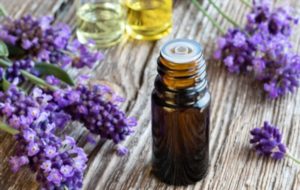 Lavender oil is one of the most popular and well-known essential oils. Renowned for its relaxing effect, it can help to reduce skin complaints exacerbated by stress. Stress can cause the skin to produce more sebum which is an open invitation for acne and breakouts, especially when combined with a face mask. With anti-inflammatory, antibacterial, antifungal, antioxidant, antiseptic properties lavender oil is a gentle natural remedy to ease acne, eczema and general inflammation, and enhance healing.
Lavender oil is one of the most popular and well-known essential oils. Renowned for its relaxing effect, it can help to reduce skin complaints exacerbated by stress. Stress can cause the skin to produce more sebum which is an open invitation for acne and breakouts, especially when combined with a face mask. With anti-inflammatory, antibacterial, antifungal, antioxidant, antiseptic properties lavender oil is a gentle natural remedy to ease acne, eczema and general inflammation, and enhance healing.
How about a natural face mask to pamper the skin once a week? Try this natural soothing recipe to restore the skin back to its natural glory:
Ingredients:
3 tbsp. Oat flour, 1 ½ tbsp. coconut oil, 6 drops lavender essential oil, 6 drops tea tree essential oil.
Method: Mix the oat flour and coconut oil together to form a smooth paste. Add the tea tree oil and ensure that it is evenly distributed, then add the lavender oil.
How to use: For best results use as soon as possible after preparation. Apply a thick layer to the skin, paying particular attention to any acne-prone areas, and taking care to avoid the eyes and mouth. Leave for 15 minutes and rinse off with warm water and gently pat the skin dry.
 The skin can additionally benefit from an aromatherapy steam facial. Simply add a few drops of eucalyptus and frankincense to a bowl of hot water, lean your face over the bowl, cover with a towel and spend several minutes allowing the warm steam to penetrate your pores and impart their natural benefits, Allow the aromatherapy effects to soothe the mind.
The skin can additionally benefit from an aromatherapy steam facial. Simply add a few drops of eucalyptus and frankincense to a bowl of hot water, lean your face over the bowl, cover with a towel and spend several minutes allowing the warm steam to penetrate your pores and impart their natural benefits, Allow the aromatherapy effects to soothe the mind.
Stay healthy and protected. With the proper care, there is no need to compromise the condition of your skin for your general health.

